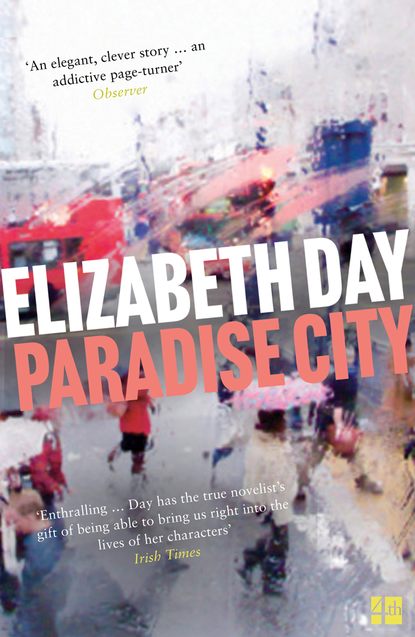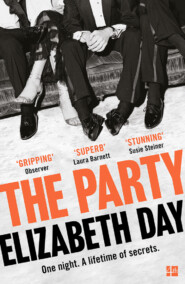По всем вопросам обращайтесь на: info@litportal.ru
(©) 2003-2024.
✖
Paradise City
Автор
Год написания книги
2018
Настройки чтения
Размер шрифта
Высота строк
Поля
Manny had ignored her and she knew, without him having to say anything more, that she was not to ask too many questions. In the end, she’d accepted the gift gratefully. One day, she knew, Manny would call in the favour. She was ready for it.
‘I’m good, Manny, good. How’s business?’
‘Oh you know what they say: Can’t complain. Mustn’t grumble.’ Manny throws his head back and roars with laughter, his mouth wide open so that she can see the startlingly red tip of his tongue. ‘How’s the hotel?’ he asks.
Beatrice shrugs.
‘Hey, listen. Do you mind if I use a computer?’
‘Be my guest,’ Manny says, gesturing towards the nearest terminal. ‘Number 4. Anything I can help you with?’
‘No. Thanks, Manny.’
He stares at her lazily. His pupils are dilated and his breath smells of marijuana smoke. She always wonders how much of Manny’s laid-back demeanour is the result of generous self-medication. Sometimes, on her way to a late shift, she’ll see Manny sitting on the low wall just outside the tube station, brazenly smoking an enormous spliff without any concern that he might be seen or arrested. He gathers waifs and strays around him, greeting them all with the same approachable smile, and if you didn’t know him, you’d think he was the nicest, softest person you’d ever seen. But she’s seen Manny turn, his temper gleaming and rapid as a flick-knife. You didn’t want to get on the wrong side of him. So far, Beatrice had managed not to.
For some reason, Manny had liked her from the start. She’d walked into his internet café one day on the edge of tears because she’d just heard her refugee status was up for review and needed to do some research but was struggling to understand the Home Office’s impenetrable bureaucratic language.
‘Why are you so sad?’ he’d asked, as if it were the most natural question in the world. And because it was the first time in months that a stranger had asked her how she was, the whole story had tumbled out of her.
Almost the whole story.
She hasn’t told Manny she is a gay. She still hasn’t been able to find the words. Suppression does that to a person. Besides, she doesn’t kid herself: she knows that, if Manny is attracted to her, he will be more willing to do things for her. She is caught, internally, between thinking this is a dishonourable way to behave and believing, bitterly, that it is the least the world owes her. If she is to be forced to live a lie about her sexuality, Beatrice reasons, then at least she will live it to her own advantage.
None of this is Manny’s fault, of course. But he is a man. An African man. She has heard him talk about women. Sometimes, when she is in the internet café, the electronic bell will ring and it will be one of Manny’s many friends. They will saunter up to the counter, these friends, with their sleazy smiles and lazy gaits, with their hair close-cut to their scalps, their muscles slicked with the sweat of the night before. They look like young boys playing dress-up in jeans that are too big for them, slung low on their waist with their underpants on display for anyone to see.
These friends do not notice Beatrice sitting there, like a small, unimportant shadow of someone who used to be. Nor do they acknowledge the sullen, tattooed girl in the corner, tip-tapping on the keyboard with gel-tip nails to update her Facebook page. They do not notice the woman in a hijab, silently typing up her CV. They do not register any woman who has not expressly packaged herself to attract male attention. Instead, these friends walk straight up to Manny who stands there, like a king awaiting his courtiers, his face emerging from behind the refrigerated drinks shelves that are always optimistically stocked with faded cartons of exotic fruit juice: lychee, mango, papaya.
Yes, Beatrice has heard Manny talk about women: she has heard his dirty laughs and his whispered jokes and the slap of the palm of his hand in a congratulatory high-five. She knows men like Manny, who need sex and power like most people need bread and water. Even his name is a distillation of masculinity. She wonders, occasionally, whether Manny is a nickname, given to him by an admiring coterie of young men in acknowledgement of his sexual prowess. Or perhaps it genuinely was the name his parents gave him and the way he turned out was a fateful coincidence. ‘Nominative determinism’, they called it. She’d heard a discussion about it on the breakfast radio after a man called Mr Diamond had been forced to step down from his position as head of a failing bank, only to be replaced by a colleague called Mr Rich. She smiles at the thought of this.
‘Now that’s what I like to see!’ Manny reaches into the refrigerated shelves and hands Beatrice a carton of lychee juice. ‘A lovely smile on a beautiful woman.’
He winks. She rolls her eyes, accepts the juice and takes her seat at the computer.
‘Hey, Beatrice, one day you’ll realise we’re meant to be together.’
‘Yes, Manny. And one day pigs will take to the sky with wings.’
He guffaws then disappears into a back room to turn up the radio. A thumping reggae beat rings out just as Manny re-emerges and starts to dance, swaying his hips suggestively, eyes half-closed as he clasps an imaginary partner to him. An unlit joint is tucked behind his ear. She can’t help but laugh. Yet she tilts the screen ever so slightly away from the counter so Manny can’t see what she’s doing. There are elements of her life that Beatrice knows it would be wiser to keep private. Howard Pink, for instance. That was something she wanted to do on her own.
She logs on to the computer, double-clicking on the internet icon. She types ‘Sir Howard Pink’ into the Google search bar. Rapidly and methodically, she clicks through the relevant documents, assimilating information. It feels good to be using her brain again. She finds out that Sir Howard had started in business at the age of fifteen, selling clothes from a market stall. At twenty-one, he’d bought his first shop. By thirty, he was a millionaire. By thirty-five, after an aggressive corporate takeover, he had bought out the Paradiso Group of clothing shops. He was routinely in the top fifty of the Sunday Times Rich List, with an estimated fortune of £3.3 billion. He has a reputation for throwing lavish theme parties, which turns up a number of unexpected images: Sir Howard in an Hawaiian shirt and grass skirt on his fiftieth birthday, celebrated on a private Greek island with six hundred of his closest friends (and a performance by Stevie Wonder); Sir Howard laughing riotously while dressed up as a medieval pope; Sir Howard sporting a giant sombrero accompanied by an unsmiling blonde woman in a nurse’s outfit. Then there was all the stuff about his daughter, Ada, who had gone missing at the age of nineteen in mysterious circumstances. Beatrice skims over these stories. They aren’t what she needs to focus on. Everyone has sadness in their lives. It does not elicit her sympathy.
After twenty minutes or so, she has all the information she needs, including an email address for the chief executive’s office at Paradiso. She opens up a new Microsoft Word file. The screen fills with a blank white page, like a fresh sheet pulled tight on a hotel bed.
‘Dear Sir Howard,’ she writes in Arial 12-point. The animated paperclip pops up in the corner of the screen. ‘You look like you’re writing a letter,’ a speech bubble says. ‘Would you like some help?’ Beatrice scowls. No, she thinks, I don’t need anyone’s help. Not any more. This, I’m doing for me. She takes a deep breath, then types: ‘You won’t remember me but we met in Room 423 of the Hotel Rotunda in Mayfair.’
Howard (#u718a0743-1663-5813-9828-8e6b38fbb191)
He’s never seen the point of opera, to be honest. All that faffing about on stage, those fat people singing declarations of love in a foreign language while everyone in the audience sits puffed up with their own pretension, fanning themselves with programmes that cost more than an hour’s wage for the Polish babysitter back in SW3. No, if he had a choice, he’d rather go to a musical. A couple of hours of Andrew Lloyd Webber with an ice cream in the interval and he’s happy as a clam. As he reminded Claudia on the way to the Royal Opera House this evening: it’s a fraction of the cost for essentially the same form of entertainment.
‘No, Howie,’ she’d said, inspecting a fleck of dirt caught in the edge of a long acrylic nail. ‘No, it’s not.’
‘It’s all singing, isn’t it?’ He knew, of course, that he was being impossible, that he didn’t fully believe what he was saying. But the temptation to wind Claudia up by playing the ill-educated buffoon was irresistible. He caught Jocelyn eyeing him in the rear-view mirror with a carefully neutral expression. Sometimes – not very often, admittedly – Howard wondered what his driver thought of it all. Jocelyn was a miner’s son from the Welsh Valleys. He would probably be horrified to learn they had spent the best part of £600 on a couple of tickets to the Royal Opera House when neither of them really cared about the art form. Because although Claudia pretended to read the programme notes, she wasn’t interested in the performance. The most important thing for her was to be seen and, preferably, photographed by one of the Society magazines. He could already imagine the caption: ‘On Monday, Lady Claudia Pink enjoyed a night at the opera. She was dressed in a discreet black-lace sheath dress by blah blah blah, accessorised with diamond drop earrings by blah blah blah, and accompanied by her husband, self-made millionaire Sir Howard Pink, CEO of the Paradiso Group.’
Self-made, my arse, Howard thinks.
Jocelyn indicates left into a side-lane, just off Bow Street and pulls up in a disabled parking bay.
‘What is it we’re seeing tonight anyway?’ Howard asks.
‘La Bohème, dear,’ Claudia replies, the ‘dear’ dropping down his back like ice.
‘What’s the story?’
‘Penniless writer falls in love with charming flower girl. They split up. Get back together. Flower girl dies of tuberculosis. Or consumption. Are they the same thing? I never know.’
Claudia takes out her compact to powder her nose, then clicks it back into place, slips it into a sequinned clutch bag and waits for Jocelyn to open the door without glancing at her husband.
‘Sounds a right laugh,’ Howard says, getting out and stepping directly into a shallow puddle which leaves a faint tidemark on the toe of his polished black shoes. He walks round and proffers his arm to Claudia. As they move along the pavement, he hears the soft silky friction of her stockings and is aroused in spite of himself. He gives her a friendly squeeze on the hand. She smiles at him, briefly, then allows the smile to slide from her face so quickly it leaves no mark on her features. He is reminded of his mother, wiping the kitchen table clear with a dishcloth, catching the crumbs in one cupped hand.
They are ushered up two flights of stairs and directed along the red-carpeted corridor towards the Royal Box. Howard likes to sit here despite the fact that the view is obscured. He gets off on the thought that he is sitting in the same place as the Queen, even though the gilded chair with rococo swirls where Her Majesty actually takes her seat for a performance remains roped off in the corner.
You can always get close, Howard thinks as a member of staff takes his coat and gives him a glass of champagne in one swift motion, but never close enough.
He and Claudia have invited three business associates and their partners to join them this evening. It’s a good way, he finds, of getting people on-side. A night at the opera still carries a certain je ne sais quoi, especially for the Yanks.
Вы ознакомились с фрагментом книги.
Приобретайте полный текст книги у нашего партнера:
Приобретайте полный текст книги у нашего партнера:









